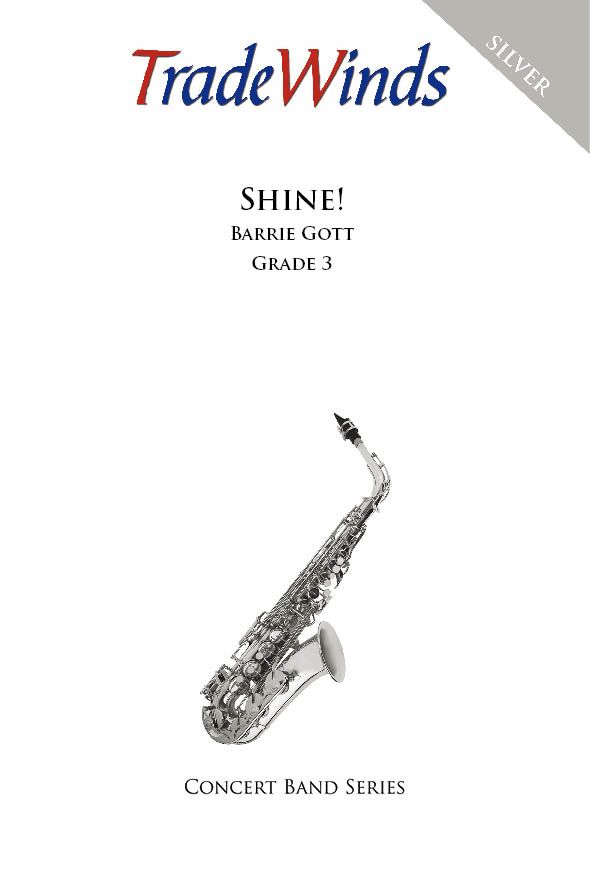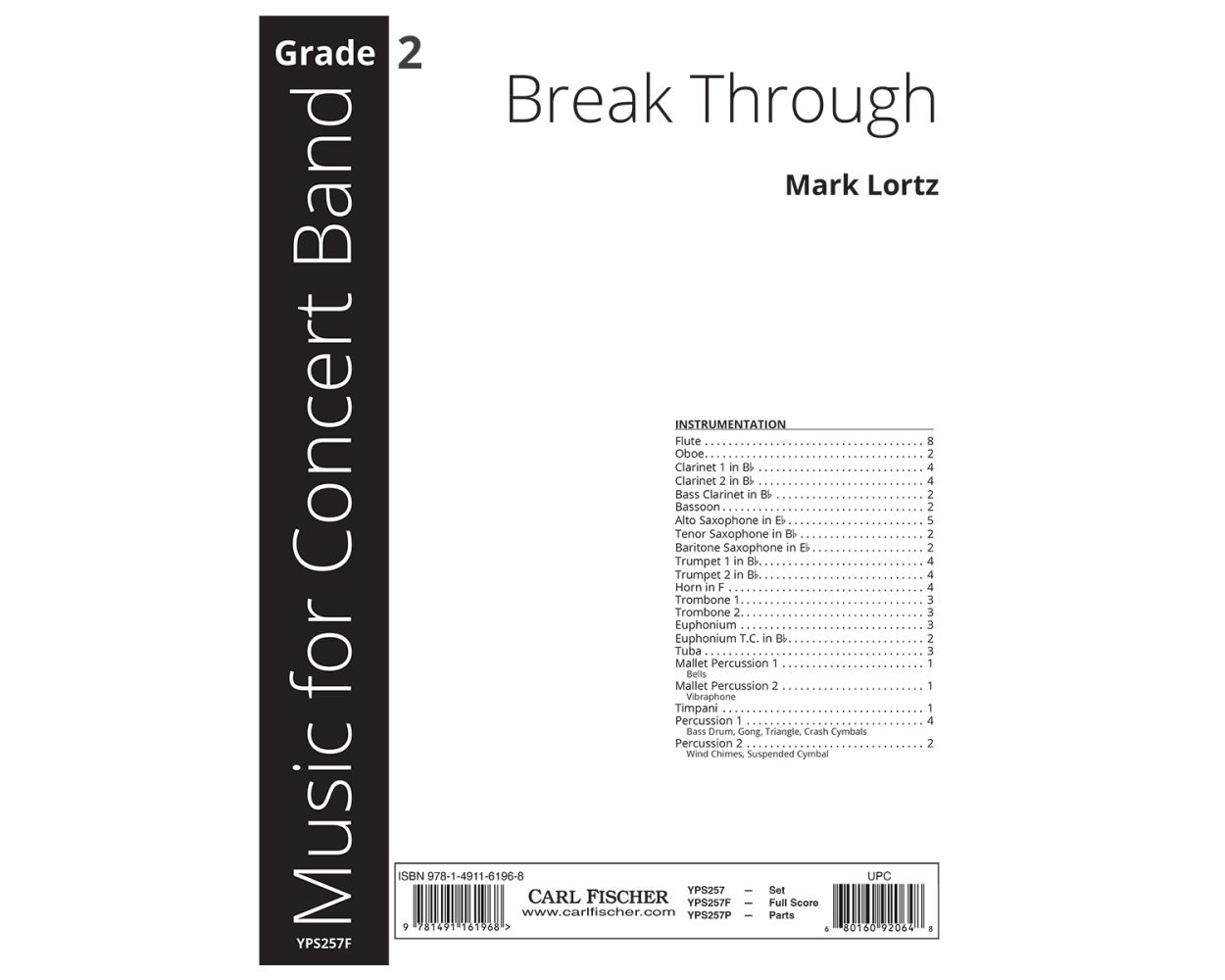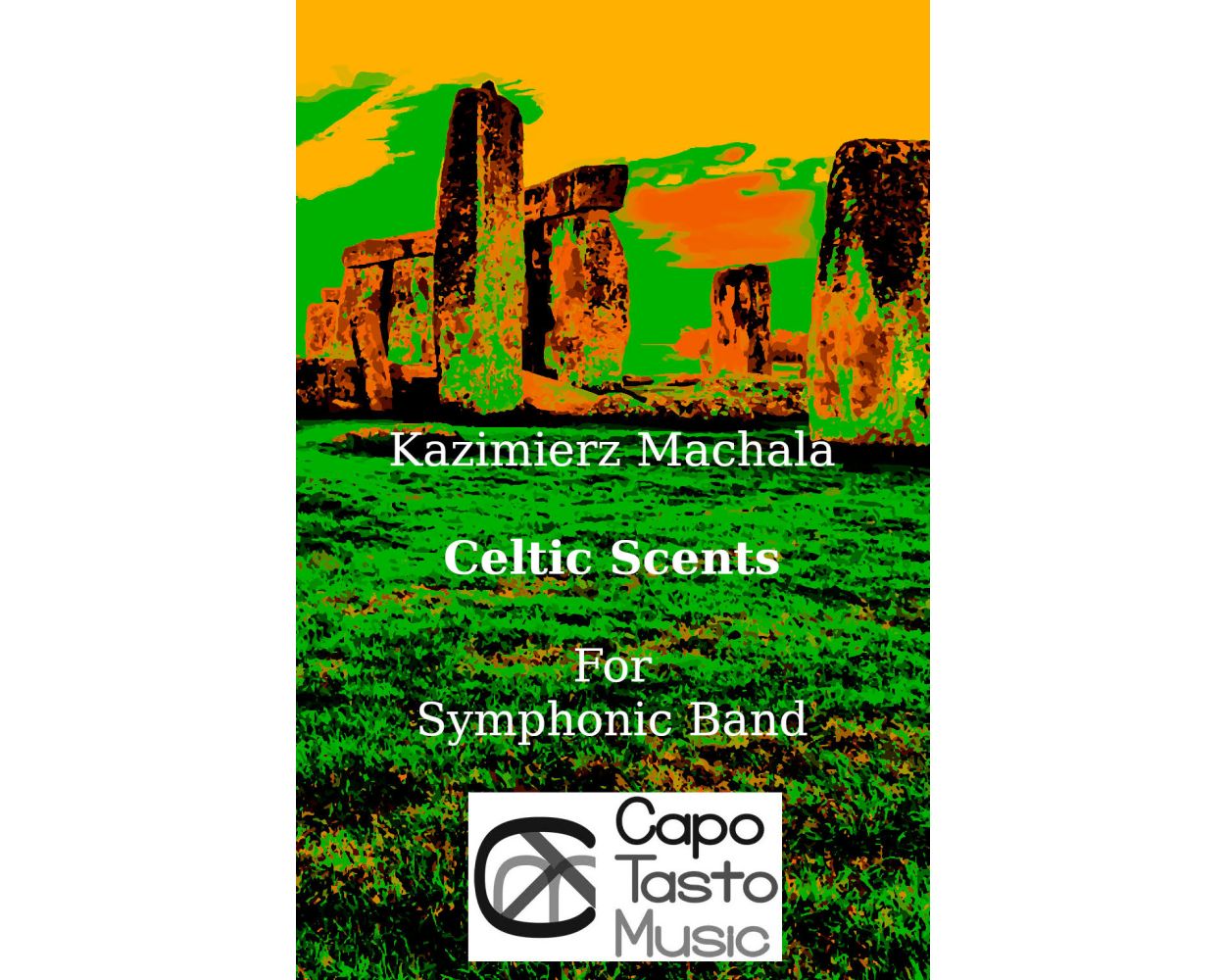Results
-
 £33.98
£33.98A Little Waltz - Wind Band (Andrew Wainwright)
Composer: Andrew Wainwright A delightful French Romantic style waltz which gives scope for various soloists around the band to display their musical prowess. Ideal for a lighter moment in your band's concert programme. PDF download includes score and full set of parts. Sheet music available from : UK: www.wind-band-music.co.uk USA: www.solidbrassmusic.com Difficulty Level: Medium Instrumentation: Flute Oboe Bassoon Clarinet in Bb 1-2 Bass Clarinet in Bb Alto Saxophone Tenor Saxophone Baritone Saxophone Trumpet in Bb 1-2 Horn in F 1-4 Trombone 1-2 Bass Trombone Euphonium Tuba Double Bass (optional) Triangle Suspended Cymbal
In stock: Estimated dispatch 1-3 days
-
 £75.52
£75.52Variations on Was Lebet - Wind Band (Andrew Wainwright)
A magnificent major work based on the German chorale 'Was Lebet' (O worship the Lord in the beauty of holiness). The piece is made up of five contrasting variations. A majestic, fanfare-like section opens the work, leading into a giocoso classical-style variation. The beautiful Variation 2 is reflective and plaintive, while the next variation is somewhat quirky and volatile in nature. There is a French romantic feel to Variation 4, with a playful waltz providing scope for various soloists around the band to display their musicianship. Variation 5 is fugal in nature, with each section of the band being handed the theme at various points. The sense of motion builds gradually to a grandiose presentation of the theme, the first time that it is heard in its full form, bringing the work to a thrilling, majestic conclusion. *Please note audio and video are of the brass band version. To view The International Staff Band performing the brass band version of the work, please visit https://www.youtube.com/watch?v=LCxs7SpulHY PDF download includes score and full set of parts. Sheet music available from : UK: www.wind-band-music.co.uk USA: www.solidbrassmusic.com Difficulty Level: Advanced Instrumentation: Flute/Piccolo Flute 1-2 Oboe 1 Oboe 2/English Horn Bassoon 1-2 Contrabassoon Clarinet in Bb 1-3 Bass Clarinet in Bb Alto Saxophone 1-2 Tenor Saxophone Baritone Saxophone Trumpet in Bb 1-3 Horn in F 1-4 Trombone 1-2 Bass Trombone Euphonium Tuba Double Bass Timpani Percussion 1-4
In stock: Estimated dispatch 1-3 days
-
£88.00
Tancuj
Tancuj, Tancuj, Vykrcaj / Dance, Dance, Spin Around / Tanz, Tanz, Dreh Dich / Dance, Dance, Tourne, Tourne
Estimated dispatch 10-14 working days
-
 £54.95
£54.95Shine!
Composer: Barrie GottDuration: 3.00Series: Silver TradeWinds Concert Band SeriesGrade/Difficulty: 64Barrie Gott, originally from Sheffield, now living in in the suburbs of Sydney Australia has, in the past, composed 2 very successful swing numbers, entitled Light-walk and Swingtime Religion; here is a brand new third piece to add to the collection. Set around the spiritual This little light of mine it will feature well on most types of concert programme and will be enjoyed by all.
Estimated dispatch 7-14 working days
-
 £61.00
£61.00Messages of Christmas - Traditional
The Christmas season means different things to people around the world. For many, it presents an opportunity to express peace and goodwill towards others in various ways. The lyrics of the three melodies used in this arrangement are all specifically written to spread the messages of Christmas: Hark! The Herald Angels Sing, The First Noel, and Go Tell It On the Mountain.An uplifting holiday concert selection that expresses hope and peace.
Estimated dispatch 12-14 working days
-
 £57.00
£57.00Jazz Kings
This jazz styling of the popular holiday carol "We Three Kings" offers a tribute to artists who are considered jazz royalty: Duke Ellington and Count Basie. Shades of "It Don't Mean a Thing" and "One O'Clock Jump" emerge around the carol tune as it moves between sections of 4/4 and 3/4 time. Introduce students to playing in jazz style with this fun take on a holiday classic!
Estimated dispatch 12-14 working days
-
 £83.00
£83.00Farallones
Farallones is inspired by the Greater Farallones National Marine Sanctuary (GFNMS) off the Northern California coast. Farallones (Spanish for "cliffs") are a set of islands sometimes referred to as The Devil's Teeth by mariners - citing the many dangerous underwater shoals and shipwrecks. The opening section in 7/4 depicts the rugged environment around the islands. Descending scalar motifs and trills emphasize the fluidity of the seascape. The 12/8 section is a development depicting the resilience and dangerous beauty of the area.
Estimated dispatch 12-14 working days
-
 £49.00
£49.00The Holly and the Ivy
This setting of the beautiful holiday classic is accessible for very young bands. Its memorable melody, notated in a comfortable range, is passed around the sections of ensemble as the other parts play accompaniments that are interesting, yet not difficult. Written in bridge form, the piece begins softly, with soft sleigh bells and clarinets below the break, adding flutes, then brass, then building to a minor section and a very short percussion feature, making it a great opportunity introduce students to this form!
Estimated dispatch 12-14 working days
-
 £49.00
£49.00Break Through
Break Through is a musical representation of one's struggle to pass through a barrier or move beyond an obstacle, either a literal breakthrough or a metaphorical achievement. The composition centers around the key of G minor to achieve a sense of dark, resonant emotion. The percussion is the heartbeat and pulse for the introduction of the piece, while the bass drum and gong rolls create a lugubrious timbre. Melodies and counter-melodies weave in and out of the musical texture. A struggle ensues leading up to the climax, following which there is a resolution to the relative major key of B-flat. Finally, there is a transition to a recapitulation of the opening theme, moving towards a contemplative ending in G minor.
Estimated dispatch 12-14 working days
-
 £199.00
£199.00Celtic Scents - Kazimierz Machala
Celtic Scents is an amazing suite of wonderful musical scents (wildflowers, herbs, and trees) unified by the brilliant imagination of world-renowned teacher, performer and composer Kazimierz Machala, and the familiar sounds of Celtic folk music. This completely original work of seven movements is reminiscent of Grainger's Lincolnshire Posy, including a very creative and enjoyable harmonic palette. The composition requires a full wind band and takes advantage of colorful orchestration to link each movement more closely to the scent it represents. While Machala composed Celtic Scents originally for orchestra, he has carefully and artistically re-orchestrated the work for the modern wind band. Celtic Scents will best suit performances by collegiate and professional wind bands around the world due to the advanced technical and musical requirements. There is absolutely no doubt that audiences and performers will enjoy their time spent with this joyful and engaging composition.
Estimated dispatch 12-14 working days
